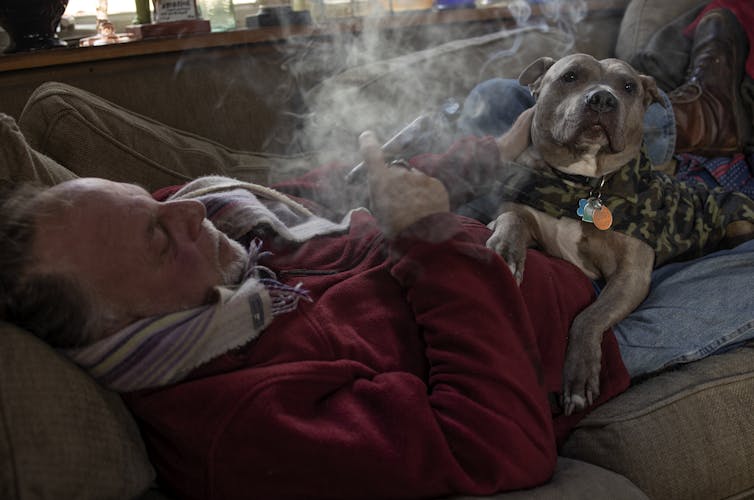Our pets share our homes, lifestyles, and sometimes even our food and beds. For many pets, this close contact with humans can include exposure to secondhand smoke from cigarettes and other air pollutants. This may have serious health consequences for our animal companions.
So, how significant a risk is passive smoking for our pets and should we be concerned?
Smoking is well understood to come with negative health outcomes for people. Between 80 and 90 percent of lung cancer cases are associated with exposure to cancer-causing compounds from first or second-hand smoking.
Passive smoking is also linked increased risks of other forms of cancer including breast and colorectal cancer, heart and respiratory disease.
Children’s oral health, development, and future health outcomes are also negatively affected by exposure to secondhand smoke.
More than 50 percent of bladder cancer cases in humans are attributed to cigarette smoking, making exposure a significant risk factor. The recent identification of passive smoking associated with dogs developing bladder cancer highlights the potentially serious health consequences of secondhand smoke for our furry friends too.
Canine Cancer Risk
Cancer is commonly diagnosed in dogs and is a significant cause of death. While many factors may predispose a pet to developing cancer, evidence suggests that passive smoking is a key risk.
Scottish terriers living in homes where they were exposed to cigarette smoke were six times more likely to develop bladder cancer than those not routinely exposed.
Nasal cancer in dogs is also linked to passive smoking, and is a particular problem for dogs with long muzzles, such as collies. This is compared to a lower incidence of nasal cancer, but higher risk of lung cancer in brachycephalic, or short-nosed breeds such as pugs.
The difference in cancer type might be linked to how dogs are exposed to the many toxic compounds found in cigarette smoke.
In dogs with longer noses, more of these compounds will potentially become trapped in their nasal tissues. Conversely, dogs with short snouts may be more likely to inhale these compounds into their lungs.
Not Just Dogs
All domestic pets living in the home are potentially at risk from exposure to secondhand smoke. This includes dogs, cats, birds, small pets such as rabbits and guinea pigs and even fish.
Cats exposed to passive smoking have an increased incidence of malignant lymphoma. Nicotine concentrations are higher in the hair of cats living with smokers than non-smokers. Similar findings have been found for dogs living with smokers, regardless of whether pet owners smoked inside or outside.
Because cats tend to self-groom by licking, they may be at particular risk of ingesting even more toxic substances from passive smoking than simply inhaling them.
Birds have particularly sensitive respiratory systems and exposure to smoke and air pollutants can be extremely distressing and harmful – think about canaries in mines. Indeed, our pets may well act as useful sentinels for air pollution more generally.
Toxic compounds found in cigarette smoke can also dissolve into the water in fish tanks, creating risks for the health and welfare of fish or amphibious pets, too.
Minimising Hazards for Health
Passive smoking alone is not responsible for health concerns in people and pets. Genetics, diet, and exposure to other potentially toxic substances in the environment all combine to affect overall disease susceptibility.
But evidence repeatedly indicates more than just a casual link between secondhand smoke exposure and serious health concerns in our pets such as cancer and respiratory illnesses.
Owners concerned about the well-being of their pet may be encouraged to be more aware of air quality in their home generally and make appropriate lifestyle changes.
Choosing to smoke outdoors can reduce some risk. Opening windows, improving ventilation and using air filters may help too, although it is important to note that even low level exposure can be harmful to our furry and feathered friends.
Indeed, awareness raising and education about the dangers of pet exposure to secondhand smoke could be an important motivator for smoking cessation.
Exposure to secondhand smoke is a common but avoidable risk factor for health concerns in pets and people alike. Reducing exposure to secondhand smoke can enhance overall health, welfare and longevity for both pets and their people.
(This is an opinion piece and the views expressed above are the author’s own. The Quint neither endorses nor is responsible for the same. This article was originally published on The Conversation. Read the original article here.)


